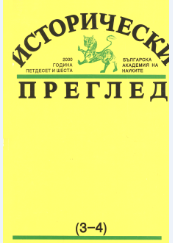Българските мюсюлмани в годините на преход (1990–1997). Етнокултурни аспекти
The Bulgarian Moslems in the Years of Transition (1990–-1997). Ethnocultural Problems
Author(s): Valery StoyanowSubject(s): History, Cultural history, Ethnohistory, Political history, Social history, Recent History (1900 till today), Transformation Period (1990 - 2010), Post-Communist Transformation
Published by: Институт за исторически изследвания - Българска академия на науките
Keywords: Islam in Bulgaria; Moslem community in Bulgaria; Pomaks; Gypsies; Tatars;
Summary/Abstract: Islam in Bulgaria is traditionally moderate, characterized by a tolerant attitude towards the difference of the “others” and their culture, and the representatives of this confessional community consider themselves rather as “European Moslems”, alien to religious fanaticism. The Bulgarian Christians have also formed in them such an ethnic tolerance, which has made it possible for them to live in understanding with the alien groups and - with minor exceptions - not to allow religious and racial pogroms which have brought dishonour on the past of many of the contemporary “great nations”. The difficulties in the transition of the post-totalitarian societies, however, have brought to light some old contradictions, which have always been a latent destabilizing factor. The disintegration of former Yugoslavia has shown how fragile could be in extreme conditions the already established links of compatibility. This holds well also for the “one nation” states and determines the increased interest in the Moslem community in Bulgaria. It is not homogeneous either. In it prevail the orthodox Sunni, bearers of the traditional Turkic Islam, supported and developed in the Ottoman Empire, Very few are the Shiites (Alevites, Allans, Kizibasi), but adherents to the puritanic fundamentalists (the so-called Harici), characteristic of the Arab world, have not been registered so far. The Bulgarian Moslems differ also by their ethnic origin. The most numerous are the Turks who in the course of time have assimilated also many representatives of other national groups confessing Islam: Bulgarian (Pomaks), Gypsies (Roma) aid Tatars. Among them the most speculations are caused by the question of the origin of the Bulgarian Mohammedans (Pomaks) whose speech has preserved numerous archaic elements, identical with those from the written monuments of the medieval Bulgarian literature, but showing also a more recent layer of Turcisms, Arabicisms and Greacisms, and belongs to the Rhodopean group of dialects of the Bulgarian language. Irrespective of the fact that the common language and traditional popular culture, as well as the information extracted from the numerous Ottoman documents attest to the Bulgarian origin of this population, the separate Balkan countries in which it lives are trying in their turn to “nationalize” it. In the Turkish literature, for instance, the Pomaks are regarded as “Rhodopean” or “mountain” Turks (in the same way as Kurds were regarded as “mountain” Turks) - heirs to the Cumanians or descendants of other Turkic tribes who prior to the appearance of the Ottomans had settled in the Rhodopes where they were Bulgarianized, forgetting their maternal tongue. In Greece, on the contrary, the Pomaks are regarded as “Islamized Slavophone Hellenes” or descendants of Thracian Pomaks who were Slavicized, and with the coming of the Ottomans - also Islamized, but who had nothing in common-with the other Balkan peoples except, naturally, with Greeks. In Macedonia they are regarded as part of the Macedonian people. Under Arab influence in the last few years emerged a new thesis according to which the Pomaks were descendants of envoys of the Prophet Mohammed who had come on his order already before the settlement of the Slavs and the Turks so as to spread Allah’s words in the Balkans. All this, put in the context of the hypothesis of the socalled “Clash of Civilizations”, advanced by Samuel Huntington, cannot but excite apprehensions. The development of Islam in Bulgaria since 1989 has been connected with the expansion of the minority rights, which equally concerns all Moslems without regard to their subconfessional or ethnic differentiation. It advances at a considerably slow pace owing to the slow “maturing” of Bulgarians society for the problems and needs of its “other” fellowcitizens. However, an excessively rapid turn in the mental sphere could hardly be expected after the decades long brainwashing and the still living Balkan nationalism kept up in Bulgaria’s neighbouring countries. The road to the revival of the minorities in Bulgaria was traced by the struggle for restoring the Moslem names – a process that can already be regarded as completed. It includes, however, also the right to use and study at school the mother tongue, the question of religious education, of the state of the Turkish media as an element of the development of the minorities of the Moslems to set up charity, cultural-educational and political associations, etc. An attempt is made in the study at outlining basically all these aspects of the development of the Turkish (Moslem) minority question in Bulgaria in the conditions of the country’s democratization and the restoration of the market economy after the collapse of the communist regime.
Journal: Исторически преглед
- Issue Year: 2000
- Issue No: 3-4
- Page Range: 112-149
- Page Count: 38
- Language: Bulgarian
- Content File-PDF

